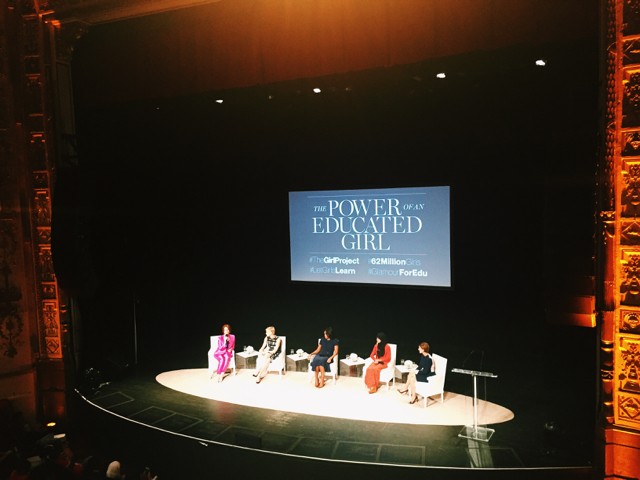“Compete With the Boys, Beat The Boys”
Tuesday, September 29 was an important day at the Apollo Theater. No, Stevie Wonder and Aretha Franklin weren’t performing. Instead, the hallowed theater was filled with 1500 school-age girls.
On that sacred stage, where so many performers have lifted their voices high up against social norms and oppressions, sat five incredible women: Julia Gillard, former Prime Minister of Australia and chair of Global Partnership for Education; Charlize Theron, award-winning actress and founder of the Charlize Theron Africa Outreach Project; First Lady Michelle Obama, First Lady, lawyer and advocate for the White House’s Let Girls Learn campaign; Plan Global’s student advocate, Nurfahada, a Filipino girl who has defied odds in order to attend school; and Cindi Leive, editor-in-chief of Glamour Magazine, which hosted the event. While all the girls, from New York City prep schools, to Girl Rising, to the Girl Scouts of North America, were as excited to see Mrs. Obama as they were for surprise appearances by Nico and Vinz and Sophia Bush, the main message of the event was clear: 62 million girls all over the world are denied an education, and that is unacceptable.
The theater seemed alive with excitement as girls sang gleefully along to a girl-power playlist that Glamour provided, and perused through gift bags filled with Luna bars, Annie’s graham crackers, Maybelline mascara, Smart Water, and of course, the latest issue of Glamour Magazine. I was one of those girls, who sat on the edge of my seat to learn about the importance of education while (ironically) missing a day of school. I was invited to join the Girl Scouts, and of course, I said yes. I would never in a million years miss an opportunity to see Michelle Obama in person.
We laughed, we cried, we sang, but most of all, we listened together as we heard again and again how girls’ education is imperative to global improvement as a whole. The more girls are educated, the more globally involved they get, the older they are before marriage, and the less susceptible they are to STDs and HIV because they have a better understanding of how they’re transmitted; they hold authoritative positions of power (teachers, government officials, lawyers, doctors, etc), they bring more money and success into their communities, they have fewer kids, their kids grow up to be educated, and the cycle continues on and on.
This effect must not be undermined. In Afghanistan alone, small cultural shifts are being made, and now 40 percent of schoolchildren are girls, and 30 percent of schoolteachers are women. If this can happen in Afghanistan, it can certainly happen all around the world, as well. Through the White House’s initiative, Let Girls Learn, the federal government has made it a priority to turn vulnerable, exploited girls into powerful, strong, assertive, bright, educated young women.
The factor of confidence cannot be undermined. Insecurity and self-doubt plague girls not only in faraway places, but here in the U.S. Many girls are taught from a young age not to pursue their talents or interests, and this grave misstep results in lower numbers of women in science, technology, engineering, and mathematics (STEM) fields and healthcare jobs. Girls are often encouraged to shy away from such jobs because they’re “unladylike,” but they’re actually some of the most important, high-paying jobs a woman can hold.
But girls can also seem to suppress their intelligence for the sake of their popularity. It is sometimes heard, as Cindi Leive mentions, that girls think boys are intimidated or turned off by self-assertive and intelligent girls. To that, Mrs. Obama (arguably the greatest advice-giver known to mankind), a mother of two teenage girls, urged the audience that “I know being a teenager is hard,” and “there is no boy, at this age, that is cute enough or interesting enough to stop you from getting your education. If I had worried about who liked me and who thought I was cute when I was your age, I wouldn’t be married to the president of the United States.” Likewise, Charlize Theron professed that “there is nothing sexier than an intelligent women,” or in other words, don’t be with a boy who is too stupid to like a smart woman.
While the major takeaway was supposed to be that as privileged individuals, we need to advocate for those who are not, for me, the takeaway was that as privileged individuals, we need to be grateful for what we have. You see, we might complain about not having locks on our bathroom stall doors, or having loose-leaf textbooks, or how much homework we have on any given night, but 62 million girls all over the world would do anything to be in our place. For girls who face great obstacles just to get a basic education (and not even to take AP classes; can you imagine?), our school seems like a paradise. So I took Mrs. Obama’s wise advice to heart: “You don’t want to look back when you’re 60 and regret that you just didn’t have the patience to push through these four years of mess,” and decided that while I’m here for less than one more year, I’m going to get as much as I can out of my education. I never knew how lucky I was before that day.
As human beings, each one of us is eligible for basic human rights. Perhaps the greatest of them all is education. But for girls, who are continuously seen as weaker, as less than, as unworthy, this is especially imperative. There should be no apologies for being smart, or enthusiastic, or competitive. And girls, if anyone ever tries to tell you something is “unladylike,” or is “for boys,” remember the wise words of our First Lady, a graduate of Princeton and Harvard Law School, a lawyer, an activist, a role model, and a mother: “Compete with the boys, beat the boys, because you are worthy.”












































